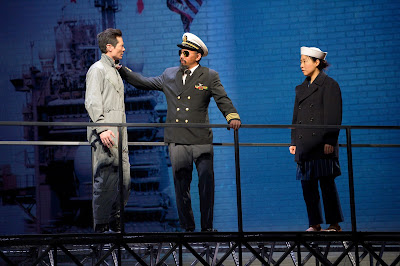Found in Translation: How Language Works in Qui Nguyen's Vietgone
By Taylor Steinbeck
From the very first scene in Vietgone, Nguyen sets out to rewrite the ways in which Vietnamese characters have previously been scripted. He does this initially through embracing contemporary language.
Tong, Quang, and the rest of the Vietnamese characters in Vietgone speak like many young Americans—they curse, reference pop culture, and use slang. This enables them to express their thoughts and emotions in a way that is not only complex and relatable, but also less tied to stereotyping.
Nguyen further subverts our expectations by making the American characters incomprehensible. While the Vietnamese characters express themselves through note-perfect American English, the American characters can only spout gibberish in the form of American clichés: “Whoop whoop, fist bump. Mozzarella sticks, tater tot, french fry.” This line from Captain Chambers aboard the USS Midway emphasizes the idea that filling dialogue with stereotypical language sounds ridiculous and demeaning. And when the American characters attempt to speak Vietnamese, they sound like the Vietnamese characters in Vietnam War films. Tong’s American admirer, Bobby, declares his feelings for her by bumbling, “Seeing you for first time was love in sight first.” By writing the Americans as “foreign-sounding,” Nguyen drives his audience’s sympathies toward the more familiar-sounding Vietnamese immigrants. Though their circumstances may make the Vietnamese characters feel powerless, Nguyen’s linguistic choices grant them the power to communicate their struggles to an American audience. It is their story that we hear.
Vietgone has been extended and now runs through April 29 at A.C.T.’s Strand Theater. Click here to purchase tickets. Want to learn more about the storytelling techniques in Vietgone? Order a copy of Words on Plays, A.C.T.'s in-depth performance guide series.
Like many Americans, Vietgone playwright Qui Nguyen grew up watching Hollywood Vietnam War films such as Stanley Kubrick’s Full Metal Jacket, but he struggled to identify with the Vietnamese characters because of how they were written. The characters often speak in an accented, pidgin English that is used either as a joke, or to exoticize them. In Full Metal Jacket, American soldiers Private Joker and Private Rafterman are approached by a Da Nang sex worker, played by Anglo Chinese actress Papillon Soo Soo. She convinces the men to pay for her services by saying, “Me so horny. Me love you long time.” This line has since become engrained in American pop culture, referenced in television series including Family Guy and South Park, and sampled in the rap hits 2 Live Crew’s “Me So Horny” and Sir Mix-a-Lot’s “Baby Got Back.” The depiction of Vietnamese characters in this way is damaging because they are presented as alien—caricatures with which audiences are not intended to empathize.
 |
| Quang (James Seol) speaks with Captain Chambers (Jomar Tagatac) through his translator (Cindy Im) aboard the USS Midway in A.C.T.'s 2018 production of Vietgone. Photo by Kevin Berne. |
PLAYWRIGHT: And though they are Vietnamese—born and raised there—for the
purposes of this tale, it is to be noted that this will be their speaking syntax:
TONG: Yo, what’s up, white people?
QUANG: Any of you fly ladies wanna get up on my “Quang Wang”?
PLAYWRIGHT: Which is the opposite of this one:
ASIAN GIRL: Herro! Prease to be meeting you! I so Asian!
ASIAN GUY: Fly lice! Fly lice! Who rikey eating fly lice?
Tong, Quang, and the rest of the Vietnamese characters in Vietgone speak like many young Americans—they curse, reference pop culture, and use slang. This enables them to express their thoughts and emotions in a way that is not only complex and relatable, but also less tied to stereotyping.
 |
| Bobby (Jomar Tagatac) flirts with Tong (Jenelle Chu) in A.C.T.'s 2018 production of Vietgone. Photo by Kevin Berne. |

